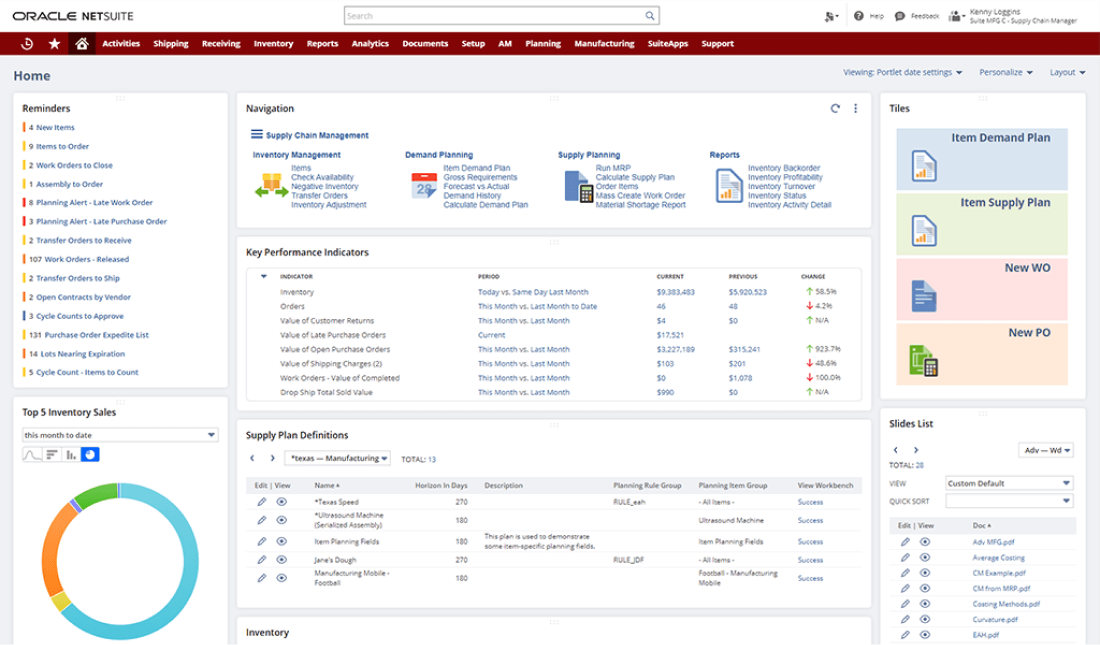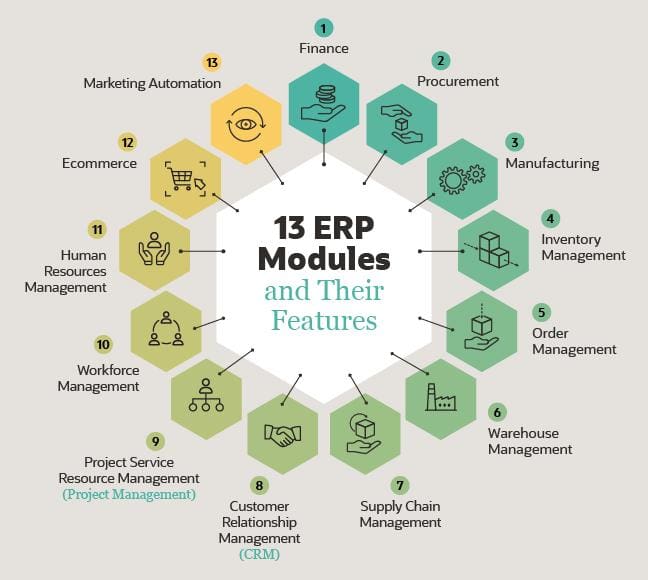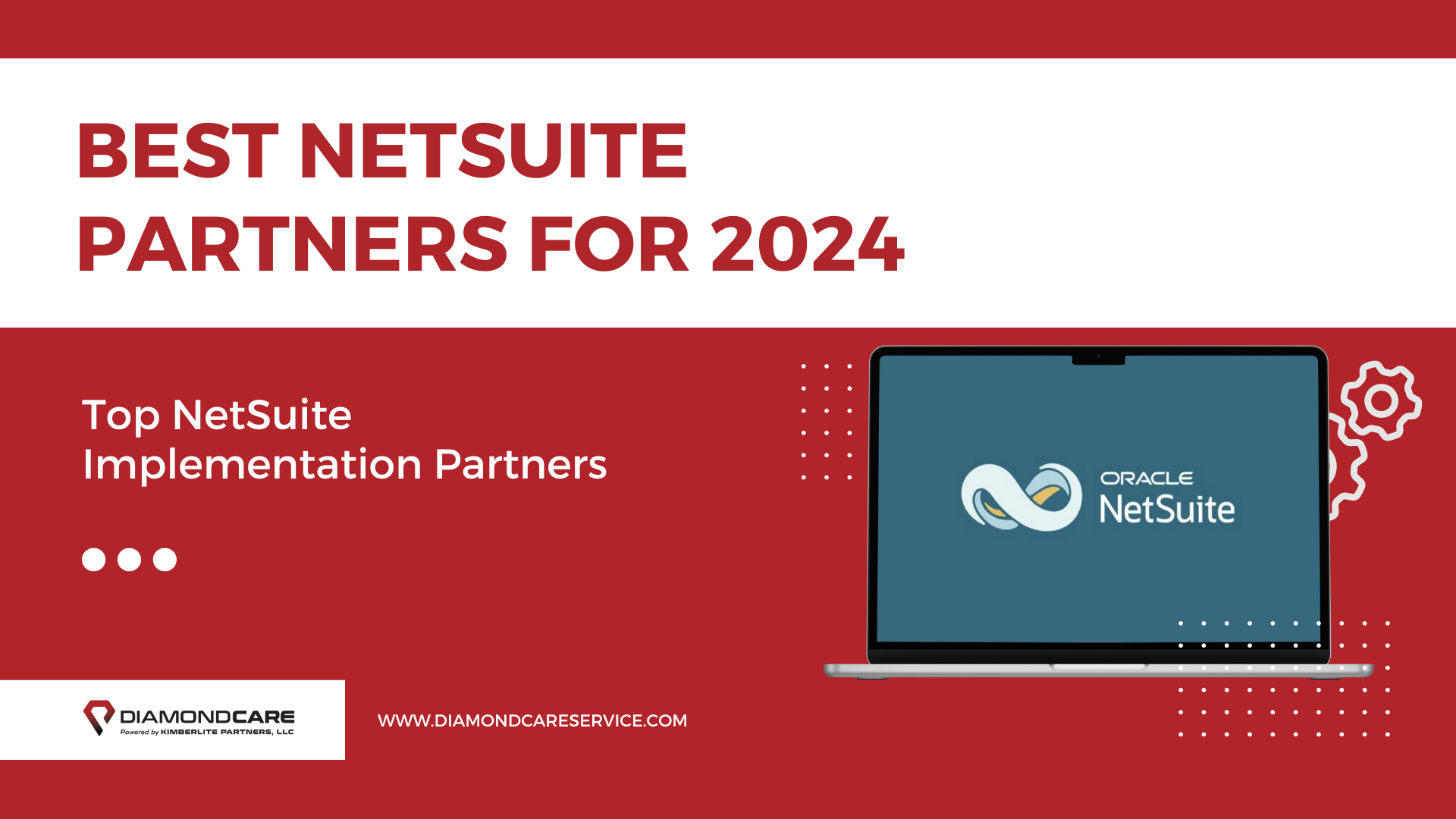NetSuite Partners List 2025: Top Solution & Implementation Providers Guide
Are you looking to streamline your business processes and take your company to the next level? Implementing a robust ERP system like NetSuite can be...
.png?width=450&height=315&name=Untitled%20design%20(75).png)
Our experts guide you through every step — from planning to go-live — ensuring a smooth, successful NetSuite rollout tailored to your business.

Post-implementation support that goes beyond one-size-fits-all solutions.
Join a team that values growth, collaboration, and innovation. We believe in empowering people to do their best work while enjoying the journey.
15 min read
Admin : Jan 10, 2025 7:00:00 AM
NetSuite is a cloud-based enterprise resource planning (ERP) software suite that helps businesses manage core functions such as accounting, financials, customer relationship management (CRM), e-commerce, and inventory. Designed to be an all-in-one business management solution, NetSuite provides real-time visibility into operations, enabling organizations to streamline processes and improve decision-making.
Unlike traditional on-premise ERP systems, NetSuite operates entirely in the cloud, eliminating the need for expensive hardware and IT maintenance. This means businesses can access their data from anywhere, at any time, with automatic updates ensuring they always have the latest features and security enhancements.
 NetSuite was founded in 1998 as one of the first cloud-based business applications, well before cloud computing became mainstream. Originally called NetLedger, the company was backed by Larry Ellison, co-founder of Oracle, and led by Evan Goldberg. The idea was simple yet revolutionary at the time: provide small and midsized businesses (SMBs) with a full-featured ERP system that was accessible over the internet.
NetSuite was founded in 1998 as one of the first cloud-based business applications, well before cloud computing became mainstream. Originally called NetLedger, the company was backed by Larry Ellison, co-founder of Oracle, and led by Evan Goldberg. The idea was simple yet revolutionary at the time: provide small and midsized businesses (SMBs) with a full-featured ERP system that was accessible over the internet.
Over the years, NetSuite evolved beyond its SMB roots, expanding into mid-market and enterprise sectors. Its flexibility and scalability made it a preferred choice for companies looking to grow without the constraints of legacy systems. In 2016, Oracle acquired NetSuite for $9.3 billion, further integrating it into its ecosystem and enhancing its capabilities for larger businesses.
Today, NetSuite serves over 37,000 organizations across the globe, spanning multiple industries and business sizes. Its comprehensive suite of modules makes it adaptable to different business needs, from startups to multinational corporations.
One of the biggest strengths of NetSuite is its versatility—it’s used by a wide range of businesses across industries, including:
✅ Manufacturing & Distribution – Companies use NetSuite to manage supply chains, automate inventory tracking, and optimize production planning.
✅ E-commerce & Retail – NetSuite's built-in e-commerce and point-of-sale (POS) capabilities help businesses integrate online and in-store operations.
✅ Professional Services – Consulting firms, marketing agencies, and IT service providers rely on NetSuite for project management, billing, and resource planning.
✅ Software & Technology – SaaS companies and tech startups use NetSuite to handle subscription billing, financials, and compliance reporting.
✅ Healthcare & Life Sciences – NetSuite supports healthcare organizations with financial management, regulatory compliance, and supply chain tracking.
✅ Nonprofits – Charities and nonprofit organizations leverage NetSuite to manage donations, grant tracking, and financial transparency.
In terms of company size, NetSuite is often associated with small to mid-sized businesses (SMBs), but its scalability allows it to support fast-growing startups, mid-market enterprises, and even divisions of Fortune 500 companies.
Because NetSuite is modular, businesses can start with the core financial system and expand functionality as they grow, adding CRM, supply chain management, or industry-specific capabilities as needed.

NetSuite isn’t just another ERP system—it’s a comprehensive business management suite designed to integrate multiple functions into a single, cloud-based platform. What makes NetSuite powerful is its unified data model, meaning all departments operate from the same source of truth. No more disconnected systems or manual reconciliations. Below are the key features that make NetSuite a go-to solution for businesses across industries.
At the core of NetSuite is its robust financial management system, built to handle everything from basic bookkeeping to global financial consolidation. With NetSuite’s general ledger, accounts payable/receivable, tax management, and real-time financial reporting, businesses can automate accounting processes and gain real-time visibility into financial performance.
With built-in compliance controls, NetSuite helps businesses meet financial regulations like GAAP, SOX, and IFRS, reducing the risk of errors and audit issues.
NetSuite CRM provides a 360-degree view of customer interactions, from initial lead capture to post-sale support. Unlike standalone CRM tools, NetSuite’s native integration with ERP and e-commerce ensures that sales, marketing, and customer service teams work with real-time customer data.
By connecting sales, finance, and operations, businesses can shorten sales cycles, improve forecasting, and enhance customer satisfaction.
NetSuite is one of the few ERP systems with built-in e-commerce functionality, making it an excellent choice for businesses selling online. NetSuite’s SuiteCommerce solution allows retailers and wholesalers to manage online stores, in-store POS systems, and back-end operations in one platform.
Unlike third-party e-commerce platforms that require integrations, NetSuite’s native e-commerce capabilities reduce complexity and provide real-time financial reporting on online sales.
For manufacturers, distributors, and retailers, inventory and supply chain visibility are critical. NetSuite offers real-time tracking of inventory across warehouses, stores, and distribution centers, ensuring accurate stock levels and efficient fulfillment.
With real-time supply chain visibility, businesses can reduce carrying costs, prevent stockouts, and improve customer satisfaction.
Data-driven decision-making is at the heart of NetSuite. With built-in business intelligence (BI) tools, companies can generate custom dashboards, reports, and KPIs tailored to their specific needs.
Because NetSuite’s BI is native to the platform, businesses don’t need third-party analytics software—everything is in one place, with real-time access to key business metrics.
What sets NetSuite apart is its unified platform, eliminating the need for multiple disconnected systems. Businesses benefit from improved efficiency, reduced IT costs, and better decision-making with real-time access to financials, sales, inventory, and customer data.
One of the biggest advantages of NetSuite is its modular structure, allowing businesses to tailor the platform to their specific needs. Unlike traditional ERP systems that come as one-size-fits-all, NetSuite provides a core set of functionalities that can be expanded with industry-specific modules and customizations. This flexibility makes it suitable for companies across various industries, from manufacturing and distribution to software and professional services.

NetSuite’s core system provides essential enterprise resource planning (ERP) functionality, covering financial management, order processing, inventory control, and customer relationship management (CRM). These standard modules form the foundation of NetSuite and are included in most base implementations. However, as companies grow and their operations become more complex, they often require specialized features that extend beyond the core ERP capabilities. This is where NetSuite’s add-on modules come into play.
These modules are typically part of the base NetSuite ERP package and serve as the foundation for business operations.
These modules provide advanced capabilities beyond the standard features and can be purchased separately based on business needs.
Recognizing that different industries have unique needs, NetSuite developed SuiteSuccess, a set of pre-configured solutions designed to streamline implementation. SuiteSuccess follows a four-stage lifecycle approach—Build, Engage, Consume, and Optimize—ensuring that businesses not only implement NetSuite efficiently but continue to refine and expand their usage over time. By leveraging deep industry expertise, SuiteSuccess delivers pre-configured templates that include real-world use cases, ensuring organizations start with a system that is already aligned with their business processes.
SuiteSuccess is available across a variety of industries, each with specialized configurations tailored to specific operational needs:
Manufacturing: Offers tools for production planning, supply chain visibility, and shop floor automation to streamline manufacturing operations.
Wholesale Distribution: Provides inventory management, demand forecasting, and supplier collaboration to enhance supply chain efficiency.
Software & Technology: Designed for SaaS and technology companies, supporting subscription billing, revenue recognition, and compliance with ASC 606.
Professional Services: Enables service-based businesses to optimize project management, billing, and resource allocation.
Retail & E-commerce: Supports omnichannel commerce, order management, and personalized customer experiences through integrated POS and online storefronts.
Nonprofit: Assists nonprofit organizations with donor management, grant tracking, and compliance to improve financial transparency.
These tailored editions help companies avoid the lengthy customization process by delivering an out-of-the-box configuration that aligns with their operational needs, ensuring a faster return on investment. These packages help companies avoid the lengthy customization process by delivering an out-of-the-box configuration that aligns with their operational needs.
For businesses requiring deeper customization, NetSuite offers several tools to adapt the system beyond standard configurations. SuiteScript, NetSuite’s proprietary scripting language, allows developers to create custom workflows, automate processes, and integrate with external applications.
Common use cases for SuiteScript include:
NetSuite also provides SuiteFlow for workflow automation and SuiteBuilder for no-code/low-code customizations, allowing non-technical users to modify fields, forms, and dashboards without programming expertise.
With its modular approach and extensive customization options, NetSuite can be configured to fit nearly any business model. Whether a company needs a pre-built industry solution through SuiteSuccess or a highly tailored system with SuiteScript, NetSuite provides the flexibility to scale and evolve as business needs change.
NetSuite has become one of the most widely adopted cloud ERP solutions, helping businesses of all sizes modernize their operations. Its success is driven by its ability to provide an all-in-one solution that replaces multiple disconnected systems. Companies turn to NetSuite for its flexibility, scalability, and the efficiency it brings to financial management, customer relationship management, and supply chain operations.
One of NetSuite’s biggest differentiators is its true cloud-native design. Unlike traditional ERP systems that were later adapted for the cloud, NetSuite was built from the ground up as a multi-tenant SaaS platform. This means automatic updates, lower IT maintenance costs, and seamless scalability for businesses looking to grow without the constraints of legacy software.
Another key factor behind NetSuite’s popularity is its ability to support businesses at different growth stages. Whether a company is a startup, a mid-market firm, or an enterprise with global operations, NetSuite offers modular solutions that can scale alongside business needs. Its SuiteSuccess industry-specific configurations further enhance its appeal by offering pre-built best practices tailored to different industries.
NetSuite’s value extends beyond its core features—it’s designed to help businesses scale, streamline operations, and improve efficiency. Whether a company is a fast-growing startup, a mid-market enterprise, or a multinational organization, NetSuite provides key benefits that make it a compelling choice for businesses looking to modernize their operations.
One of NetSuite’s biggest strengths is its ability to grow with a business. Many companies start with the core financial module and gradually expand their use of the platform as they scale. Unlike traditional ERP systems that may require a complete overhaul when a company outgrows them, NetSuite’s modular design allows businesses to add new capabilities without major disruptions.
This flexibility makes it particularly well-suited for companies undergoing rapid expansion or those operating across multiple locations. NetSuite provides built-in support for multi-entity management, meaning businesses with international subsidiaries or multiple divisions can manage their financials, operations, and compliance needs in a single system. Instead of struggling with disconnected systems, companies can centralize operations and maintain clear visibility as they grow.
A key differentiator of NetSuite is that it was built from the ground up as a cloud-native platform. Unlike legacy ERP solutions that require expensive on-premise hardware and ongoing IT maintenance, NetSuite is hosted entirely in the cloud. This means businesses don’t have to worry about maintaining servers, installing software updates, or dealing with downtime during system upgrades.
Being cloud-based also ensures that teams can access real-time business data from anywhere. Whether an executive is traveling, a remote employee needs access to financial reports, or a warehouse manager is tracking inventory from a mobile device, NetSuite provides a seamless experience across locations and devices.
Additionally, cloud-native ERP systems like NetSuite allow businesses to stay up to date with the latest features and security enhancements without requiring IT teams to handle complex upgrades. NetSuite continuously rolls out improvements, helping companies adapt to new compliance requirements and industry best practices effortlessly.
Most businesses rely on a variety of software tools to run their operations, whether it’s an e-commerce platform for online sales, a CRM system for managing customer relationships, or a marketing automation tool for lead generation. NetSuite’s open architecture makes it easy to integrate with these third-party applications, ensuring that businesses can maintain a connected technology ecosystem without manual data transfers or duplicate entries.
For companies already using platforms like Salesforce for advanced customer management or Shopify for e-commerce, NetSuite acts as a central hub, syncing data across departments to eliminate silos. This integration capability is especially beneficial for growing businesses that don’t want to replace every tool they use but still need a unified view of their operations.
By offering seamless connectivity with payment processors, supply chain management tools, and industry-specific applications, NetSuite ensures businesses can continue using the best solutions for their needs while benefiting from a fully integrated ERP backbone.
Investing in an ERP system is a major decision, and for many companies, the primary concern is whether the benefits outweigh the costs. NetSuite provides a clear financial advantage by reducing inefficiencies, eliminating redundant software subscriptions, and minimizing the need for manual processes.
Traditional ERP systems often require significant upfront investments in infrastructure, IT personnel, and maintenance. NetSuite, being a cloud-based solution, eliminates many of these expenses. Businesses no longer need to maintain costly servers, hire dedicated IT staff for system upkeep, or deal with the disruptions of outdated software.
Beyond reducing IT expenses, NetSuite drives operational cost savings by automating processes that would otherwise require manual effort. Financial close cycles become faster, inventory management is more precise, and reporting is instant rather than requiring hours of spreadsheet consolidation. By improving efficiency across departments, businesses can make better financial decisions, reduce errors, and allocate resources more effectively.
For companies that measure success by growth and agility, NetSuite offers a strong return on investment. By consolidating business functions into a single system, reducing IT overhead, and providing real-time insights, it empowers organizations to operate more strategically while keeping costs in check.
Choosing the right ERP system is a critical decision for any business, and NetSuite is often compared to other major players like SAP Business One, Microsoft Dynamics 365, and Acumatica. Each ERP solution has its own strengths, but NetSuite stands out in several key areas, particularly in its cloud-native design, scalability, and unified data model.
SAP Business One is primarily designed for small and mid-sized businesses, offering strong financial management and operational capabilities. However, it is not a true cloud ERP in the way that NetSuite is. While it does have a cloud-hosted option, many deployments are still on-premise or require private cloud hosting, adding complexity and IT overhead. Additionally, SAP Business One often relies on third-party integrations for e-commerce and advanced CRM, whereas NetSuite provides these natively.
Microsoft Dynamics 365 is a flexible ERP solution that integrates well with other Microsoft products like Office 365 and Power BI. However, Dynamics 365 is a modular system, meaning businesses must piece together different applications for finance, supply chain management, and CRM. This can lead to integration challenges and additional costs as companies scale. NetSuite, on the other hand, is a fully unified platform, eliminating the need for multiple disconnected applications.
Acumatica is another cloud-based ERP that competes with NetSuite, particularly among mid-sized businesses. While it offers strong customization options, Acumatica follows a usage-based pricing model that charges based on data consumption and transactions rather than per-user licensing. This can be an advantage for some companies but may also lead to unpredictable costs as a business scales. NetSuite’s pricing model, while not always transparent, is generally more predictable in terms of scaling.
One of NetSuite’s strongest differentiators is its true cloud-native architecture. Unlike legacy ERP systems that were later adapted for the cloud, NetSuite was built from the ground up as a multi-tenant cloud solution. This means businesses benefit from automatic updates, reduced IT maintenance, and seamless scalability without the need for costly infrastructure.
Another major advantage is NetSuite’s unified platform. While competitors often require businesses to integrate multiple applications for financials, CRM, and inventory management, NetSuite provides all of these functions within a single system. This eliminates data silos and ensures that all departments are working with real-time, synchronized information.
NetSuite also offers a strong focus on mid-market and high-growth businesses. While SAP Business One is primarily designed for small businesses and SAP S/4HANA is geared toward large enterprises, NetSuite fills the gap for companies that need an enterprise-grade ERP without the complexity of a large-scale SAP deployment. Similarly, while Microsoft Dynamics 365 can serve a wide range of companies, it often requires extensive customization to match NetSuite’s out-of-the-box capabilities.
Another key area where NetSuite excels is industry-specific solutions through SuiteSuccess. Unlike other ERPs that require businesses to build their workflows from scratch, NetSuite provides pre-configured best practices for industries such as manufacturing, wholesale distribution, retail, and professional services. This allows for faster implementation and a smoother transition to an ERP system.
Finally, NetSuite’s global capabilities make it a strong contender for businesses operating in multiple countries. With built-in multi-currency, multi-language, and multi-subsidiary management, NetSuite simplifies international operations without the need for extensive customizations. Many competitors require third-party add-ons to achieve similar functionality.
For businesses evaluating ERP solutions, NetSuite offers a combination of cloud-native flexibility, built-in industry expertise, and a fully integrated suite of applications that streamline operations and support long-term growth.
Implementing an ERP system is a significant undertaking, and understanding both the costs and the deployment process is crucial for businesses considering NetSuite. While NetSuite is known for its flexibility and scalability, it’s equally important to plan for the licensing structure, implementation phases, and the role of consultants or partners in ensuring a smooth transition.

NetSuite operates on a subscription-based pricing model, meaning businesses pay an annual license fee rather than a large upfront cost. Pricing is based on several factors, including the number of users, the selected modules, and whether the business requires advanced customizations. Unlike some ERP solutions with transparent pricing, NetSuite’s costs are typically quoted based on a company’s specific needs.
At the core of NetSuite’s pricing structure is a base platform license, which includes essential financial management features. Additional functionality, such as CRM, advanced inventory management, or SuiteCommerce for e-commerce, requires purchasing add-on modules. Businesses also need to factor in user licenses, as NetSuite charges per named user rather than concurrent users.
For companies with multiple subsidiaries, international operations, or industry-specific needs, costs can vary significantly. While NetSuite is often more affordable than large enterprise solutions like SAP S/4HANA, it can be more expensive than small-business ERP options. However, many organizations justify the investment by consolidating multiple disconnected systems into a single platform, reducing IT overhead and manual work.
A successful NetSuite implementation involves several key phases, each designed to ensure that the system is properly configured, integrated, and adopted by users. Unlike traditional ERP deployments that can take years, NetSuite implementations can be completed in a matter of months with the right approach.
The process typically begins with discovery and planning, where business requirements are mapped out, existing workflows are assessed, and key stakeholders define the objectives of the implementation. This phase helps determine which NetSuite modules and customizations are necessary to meet the company’s needs.
Next comes system configuration and data migration, where the ERP environment is set up, existing financial and operational data is imported, and integrations with other software tools are established. For businesses transitioning from legacy systems, this phase is critical to ensuring accurate historical data and preventing disruptions in ongoing operations.
Once the system is configured, businesses move into the testing and training phase, where workflows are validated, test transactions are processed, and employees receive hands-on training to ensure adoption. A well-planned training program can make a significant difference in how smoothly employees transition to the new system.
Finally, businesses go through the go-live and optimization stage, where NetSuite is officially launched, and real-time operations begin. In the initial weeks after go-live, companies often work closely with NetSuite consultants or partners to resolve any issues, fine-tune configurations, and optimize workflows based on user feedback.
After implementation, businesses require continued support to maintain and optimize their NetSuite environment. NetSuite offers multiple support tiers to help businesses troubleshoot issues, customize features, and scale operations effectively.
NetSuite Support Tiers
NetSuite provides different levels of support depending on business needs:
For companies needing more hands-on assistance, NetSuite partners and consultants offer additional support solutions and expertise in areas like workflow automation, custom reporting, and third-party integrations.
Given the complexity of ERP implementations, many businesses choose to work with NetSuite implementation partners or consultants to streamline the process. These professionals provide expertise in configuring the system, customizing workflows, and ensuring that the ERP aligns with the company’s operational needs.
For some businesses, especially those with industry-specific requirements, working with a NetSuite partner can significantly reduce implementation time and prevent costly mistakes. Partners offer guidance on best practices, assist with data migration, and help integrate NetSuite with third-party applications.
In addition to implementation support, many businesses continue working with NetSuite consultants for ongoing system optimization, reporting customizations, and troubleshooting as business needs evolve. Whether through in-house NetSuite administrators or external consultants, having access to expert support ensures that businesses continue to maximize the value of their ERP investment.
When approached with proper planning and the right expertise, a NetSuite implementation can transform how a business operates, providing better visibility, automation, and scalability. While pricing and deployment may vary depending on company size and complexity, the end result is a unified system that supports long-term growth and operational efficiency.
NetSuite is a powerful ERP solution that brings together financial management, customer relationship management, inventory control, e-commerce, and more into a single cloud-based platform. Its flexibility, scalability, and industry-specific solutions make it a strong choice for businesses looking to streamline operations and support growth. However, whether NetSuite is the right fit depends on a company’s unique needs, size, and long-term goals.
Businesses that benefit the most from NetSuite are those seeking an all-in-one solution that eliminates the inefficiencies of disconnected systems. Companies experiencing rapid growth, managing multiple subsidiaries, or dealing with complex inventory and supply chain requirements often find that NetSuite provides the visibility and automation needed to scale efficiently.
However, businesses with simpler needs—such as those only requiring basic accounting software—may find NetSuite to be more robust than necessary. Additionally, while NetSuite is a strong cloud ERP solution, it requires a thoughtful implementation process, ongoing administration, and a financial commitment that should align with a company’s budget and operational complexity.
For companies considering NetSuite, the first step is to conduct an internal assessment of current processes and identify the key challenges an ERP system needs to solve. This includes evaluating financial workflows, reporting needs, customer management, inventory tracking, and operational inefficiencies.
Next, businesses should explore NetSuite demos and consultations to understand how the platform would fit their specific use case. Working with a NetSuite partner or consultant can help clarify pricing, module selection, and implementation requirements, ensuring that the system is tailored to the business’s needs from the start.
Once a company decides to move forward, the implementation process should be carefully planned, considering factors like data migration, employee training, and system integrations. Businesses that take the time to properly map out their deployment strategy often see smoother transitions and faster ROI.

Are you looking to streamline your business processes and take your company to the next level? Implementing a robust ERP system like NetSuite can be...

In order to maximize their NetSuite return on investment, streamline business operations, and ensure that their decision to invest in NetSuite was...

NetSuite is one of the leading ERP platforms for a reason—it’s flexible, scalable, and built to support growing business needs. But to truly unlock...